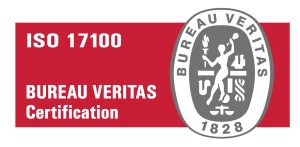For gamers, it’s fundamental that they experience complete immersion in the game while they’re playing in their native language. But achieving this level of immersion requires more than mere localization; it demands a specialized approach backed by international standards of excellence. This is where ISO 17100 certification comes into play. But what exactly does ISO 17100 entail, and why is it a game-changer in the world of game localization?
 ISO 17100 is an internationally recognized standard that addresses the quality and professionalism of translation and localization services. It sets forth a comprehensive framework for the translation process, aiming to ensure that the services provided meet consistent and high-quality standards. Anyone looking for translation and localization services can look for this certification to ensure they will get the quality they’re looking for.
ISO 17100 is an internationally recognized standard that addresses the quality and professionalism of translation and localization services. It sets forth a comprehensive framework for the translation process, aiming to ensure that the services provided meet consistent and high-quality standards. Anyone looking for translation and localization services can look for this certification to ensure they will get the quality they’re looking for.
ISO 17100 certification does not only cover the translation process, it encompasses all aspects from human resources to management and from pre-production to post-production processes. So, what exactly are the goals of this certification?
1- Quality Assurance: The first and foremost goal of this certification is to ensure that a quality assurance framework is established. It provides a structured approach to translation that includes processes, resources, and competencies necessary for ensuring the highest quality output.
2- Consistency: Another important goal of this certification is to promote consistency. This consistency is vital for industries and organizations that rely on accurate and reliable translation and localization services, ensuring that terminology, style, and meaning remain uniform across all materials.
3- Customer Satisfaction & Trust: When customers work with a translation/localization service provider that complies with this standard, they can trust that their projects will be handled by qualified professionals and adhere to rigorous quality control measures. They also know that they will experience a professional workflow from start to finish.

So, what stands in the way of every translation service provider to obtain this certification? Well, obtaining ISO 17100 is not that easy; it is a journey that demands dedication, resources, and a commitment to excellence. To meet the ISO 17100 standard, translation service providers must adhere to a set of key requirements, which include:
1- Resources: You can consider this as human resources. Each employee should conform to the requirements that come with the ISO 17100 standard, and this includes freelance workers as well. As our Vendor Manager wrote in a previous blog, there are many things we look for during vendor selection, such as experience, linguistic background, etc.
2- Pre-production processes: Translation and localization providers cannot just accept any request that comes to them. They need to assess if the project is doable and if the necessary resources are available. It’s also important that both parties agree to this transaction and the project’s terms and conditions, and they should put this in writing.
3- Production: Usually, a team for a project consists of at least three people. A project manager and two linguists. Project managers oversee the project and make sure that there is no problem, and they are also the bridge between the client and the linguists. If there are questions, the translator goes to the project manager, and the project manager goes to the client. The translator or game localization specialist ensures that the translated/localized text is free of errors.
And then comes the editor: they make sure of the consistency and accuracy of the target text. If you want to read more about project managers, translators, and editors, don’t forget to check our blog page!
4- Post-production processes: It is also crucial to listen to what the client says after the translation/localization process ends, and it’s a good idea to share this feedback with everyone involved. Also, service providers need to save all project records for a certain time and follow legal and contract rules for data protection.
In summary, achieving ISO 17100 certification demands dedication and resources, and it sets high standards, but the result is top-quality language solutions for clients. So, if you are a game developer/publisher or just looking for translation and localization services, you might consider preferring an agency that holds this certification.
We take pride in being the sole ISO 17100-certified game localization provider in Turkey, standing as a symbol of our dedication to delivering world-class language solutions. Let our quality certification elevate your gaming projects to new levels of quality and professionalism.
Written by
Ecenaz Batur
Marketing Specialist
Looking for getting tailored solutions for your game localization projects? Let’s open up a whole new world together!